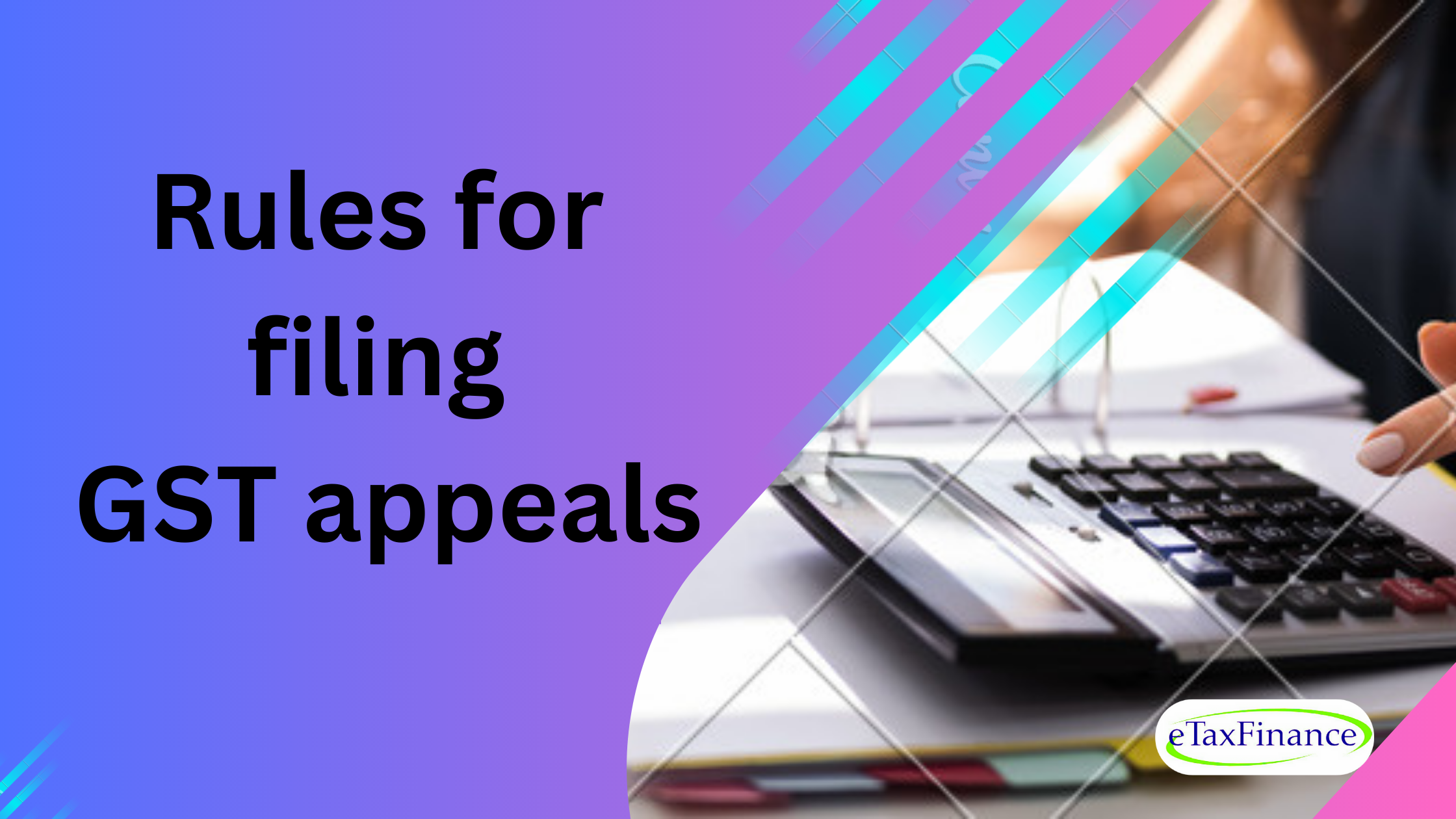What is GST Appeal?
Any taxpayer who is registered under GST has the option to appeal to the different levels of the appellate authority in case of any problem with the order passed by the GST officer, penalty or any other dispute. An GST appeal is nothing but an application made by an applicant to the higher authority with the motive to reverse the decision taken by the lower authority.
The GST law provides for a two-tier appellate mechanism to resolve disputes and enforce compliance. The first tier of appeal is with the Adjudicating Authority, while the second tier of appeal is with the Appellate Authority.
Who can file an appeal?
Any person aggrieved with the order passed by an adjudicating authority can file an appeal in GST before the Appellate Authority. Aggrieved person means who is aggrieved by a decision or order passed against him by an adjudicating authority.
Appeal can be filed either by
- taxpayer or
- tax officer
Further, the appeal must be against a decision or order passed under the GST Act which can be tax related or procedural in nature. However, there are certain orders against which appeal cannot be filed.
What is the Time Limit for filling an appeal?
The appeal shall be filed within three months from the date of communication of order by adjudicating authority. However, as per the provision of condonation of delay in filling appeal, maximum one more month is allowed that to only after furnishing of a justified reason of delay along with suitable evidence.
What are the Grounds for an appeal?
- Unlawful Demand: A taxpayer may file an appeal if they believe that the demand for tax is unlawful or incorrect.
- Penalties: Taxpayer may file an appeal if they believe that the penalty imposed on them is unjustified or incorrect.
- Classification: A taxpayer may file an appeal if they believe that the classification of goods or services is incorrect.
- Valuation: A taxpayer may file an appeal if they believe that the valuation of goods or services is incorrect.
- Refunds: A taxpayer may file an appeal if they believe that the refund claimed by them has been wrongly rejected or delayed.
What are appealable orders?
- Enforcement Order
- Assessment or Demand Order
- Registration Order
- Refund Order
- Assessment Non-Demand Order
- LUT Order
When can the appeal NOT be filed?
- An order to transfer the proceedings from one officer to another officer;
- An order to seize or retain books of account and other documents;
- An order sanctioning prosecution under the Act; or
- An order allowing payment of tax and other amount in installments
Appeals under GST:
There is a four-level appeal structure to provide relief to the taxpayers under GST:
| Level of Appeal | Order | Appeal |
| 1st | Adjudicating Authority | First Appellate Authority |
| 2nd | First Appellate Authority | Appellate Tribunal |
| 3rd | Appellate Tribunal | High Court |
| 4th | High Court | Supreme Court |
Appeal Before Appellate Authority:
- The taxpayer should file the appeals under GST within a period of 3 months from the date of communication of order by the GST Officer along with documents for grounds of appeal (within 7 days of filing an appeal), a form of verifications, a certified copy of the demand order, and challan copy for the pre-deposit.
- An appeal can be submitted either electronically or offline.
- A provisional Statement is issued after submission.
- Under GST APL-02, a final acknowledgment is issued.
- The appeal is deemed to be filed after the Final acknowledgments done under GST APL-02.
- After filing the appeal the GST Commissioner can file an application before the Appellate Authority within six months from the date of communication of decision or order in Form APL GST 03 electronically.
- In case of adjournments, the GST Commissioner may provide up to 3 adjournments to the concerned party on showing a reasonable cause and recorded in writing.
- On conclusion of the appeal process, the Appellate Authority will issue an order with a summary of the order in FORM GST APL-04 clearly indicating the final amount of demand confirmed.
- The appeals have to be made in the prescribed forms, and the minimum fees should be paid.
- The fee should be 100% of the tax amount, interest, fee, penalty, arising from such challenged order and 10% of the disputed amount. The 10% can increase up to 25%, where the disputed tax amount is above Rs. 25 Crore.
- In case the Commissioner of GST or an officer is the filing an appeal, then the prepayments of fees are not required to be made.
Appeal before Appellate Tribunal:
- The taxpayer can file the appeal to the Appellate Tribunal online, within three months of passing an order.
- The taxpayer must file the Appeal to Appellate Tribunal in Form GST APL 05.
- Fee of Rs.10,000 for every 1 lakh of tax amount in disputed should be paid.
- Appellate Tribunal’s have the powers to refuse admission of appeal, wherein the disputed tax amount or input tax credit or the difference in tax or input tax credit involved or amount of fine, fees or penalty ordered does not exceed Rs.50,000.
- The appellant is also required to pay 20% of the remaining amount of tax in dispute arising from the order, in relation to which appeal has been filed. This amount of 20% will be in addition to the amount paid at time of filing appeal before Appellate authority.
- When such amount is paid by the appellant, the recovery for the balance amount shall be deemed to be stayed till the disposal of appeal.
- The Appellate Tribunal should hear and decide every appeal within a period of one year from the date on which it is filed.
Appeal To High Court:
- Any person aggrieved by any order passed by the Appellate Tribunal may file an appeal to the High Court.
- Appeal is required to made in Form GST APL-08.
- The appeal is to be filed within 180 days from the date on which order appealed against is received by the person.
- Where an appeal shall be heard by a bench of two or more Judges. The order shall be decided according to the opinion of majority of judges.
- When there is no majority then the Judges shall state the point of law on which they differ and on that point heard by one or more of other Judges. And then such points will be decided according to the majority.
- The sum due to the Government as a result of order by the Appellate Tribunal has to be paid as per the order even if the appeal is filed in the High Court.
Appeal To Supreme Court:
- An appeal can be filed in Supreme Court against the order of Appellate Tribunal or High Court.
- The sum due to the Government as a result of order by the Appellate Tribunal or High Court has to be paid as per the order even if the appeal is filed in the Supreme Court.
For more details contact out team at +91-7991109093 or drop email us at [email protected]
Note: This Post was last updated on April 12, 2023
Disclaimer: The entire contents of this document have been prepared on the basis of relevant provisions and as per the information existing at the time of the preparation i.e. April 12, 2023. Although care has been taken to ensure the accuracy, completeness and reliability of the information provided, We assume no responsibility therefore. Users of this information are expected to refer to the relevant existing provisions of applicable Laws. The user of the information agrees that the information is not a professional advice and is subject to change without notice. We assume no responsibility for the consequences of use of such information. IN NO EVENT SHALL WE SHALL BE LIABLE FOR ANY DIRECT, INDIRECT, SPECIAL OR INCIDENTAL DAMAGE RESULTING FROM, ARISING OUT OF OR IN CONNECTION WITH THE USE OF THE INFORMATION.


